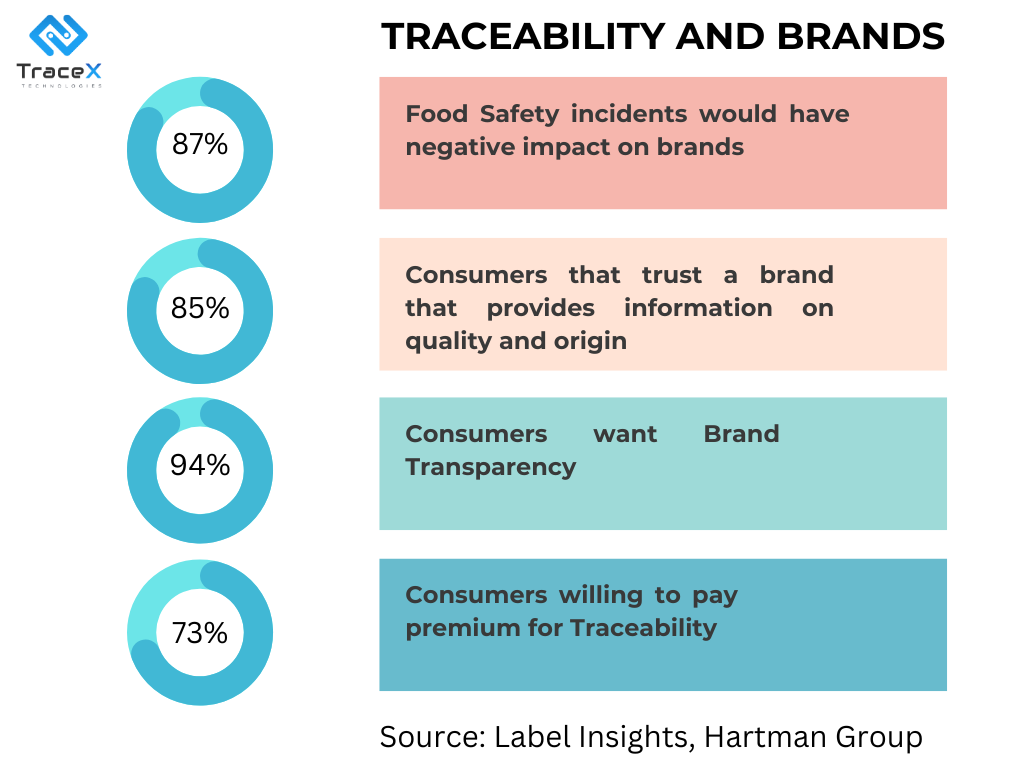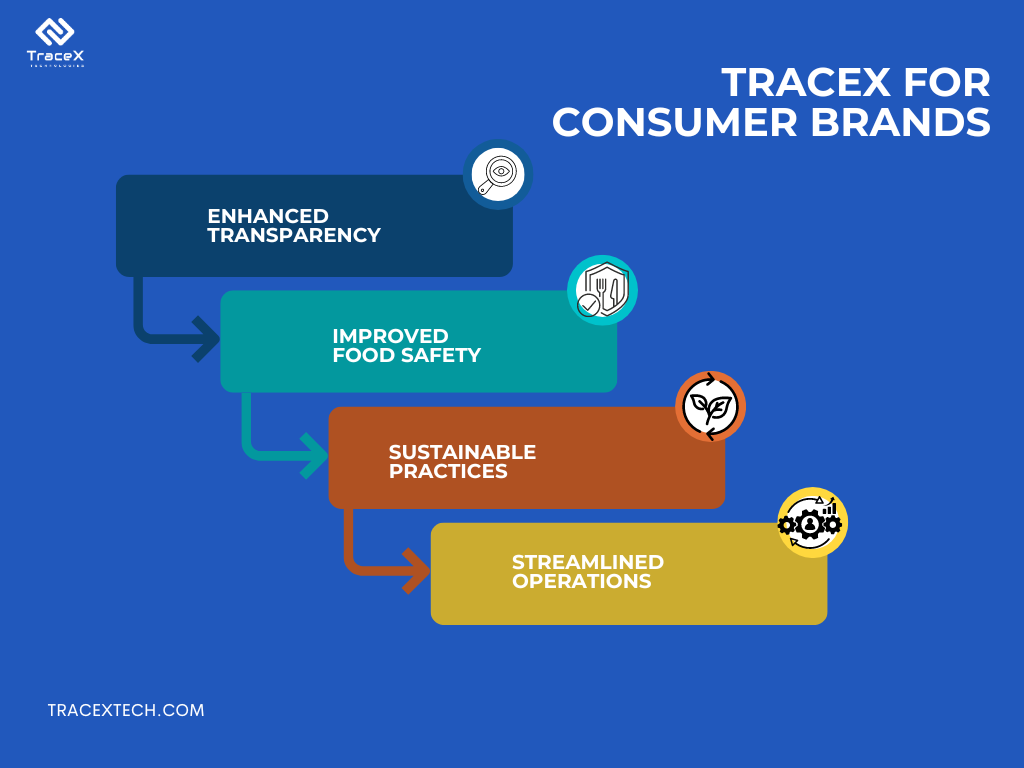Contact: +91 99725 24322 |
Menu
Menu
Quick summary: Explore the journey of food traceability and its role in conscious consumerism. Discover how transparency in the supply chain empowers consumers and drives positive change for a sustainable future.

Do you ever wonder about the story behind your food? Where did those strawberries come from? Were they grown sustainably? Did the farmers who produced them receive a fair price? Conscious Consumerism has become a key driver for food traceability
As stated in the Nielsen report, “two-thirds of consumers across the globe said they would pay more for products from companies committed to having a positive social and environmental impact.”
Conscious Consumerism: Making Informed Choices for a Better World
In today’s world, consumers are no longer satisfied with simply acquiring products. We’re increasingly concerned with the impact our purchases have on the environment, society, and our own well-being. This growing trend is known as conscious consumerism.
Conscious consumerism is the practice of making informed purchasing decisions based on a product’s social and environmental impact, alongside its price and quality. It’s about understanding the bigger picture – how your choices ripple outwards, affecting the environment, working conditions, and ultimately, the future we create.
Ethical sourcing refers to the practice of procuring materials and products in a way that respects human rights, fair labor practices, and minimizes environmental harm. Sustainable practices, on the other hand, ensure businesses meet their current needs without compromising the ability of future generations to meet theirs.
Conscious consumers actively seek out businesses committed to both. This can have a ripple effect, encouraging businesses to adopt more sustainable and ethical practices to meet growing consumer demand. Ultimately, conscious consumerism has the power to create a more responsible and sustainable future for all.
Learn how transparency fosters accountability and drives sustainable change.
Uncover the intersection of supply chain traceability and ethical practices
Have you ever wondered about the path your food takes before it lands on your plate? Who grew those vegetables? How were the animals raised for meat products? These questions are becoming increasingly important for consumers, and food traceability offers a powerful tool to answer them.
Food traceability is the ability to track the movement of food products through all stages of the supply chain, from farm to fork (or farm to table, depending on the product). This process involves documenting and recording information at each step, allowing consumers to gain valuable insights into the origin and production practices of their food.
Food traceability can reveal a wealth of information, including:
Having access to this information through food traceability empowers consumers to make informed choices aligned with their values and priorities.
Here’s how:
In essence, food traceability provides consumers with the knowledge to make informed and responsible choices. This ultimately has the potential to drive positive change in the food system, encouraging sustainable practices, ethical sourcing, and increased transparency from farm to fork.
1. Increased Trust and Transparency:
Food traceability promotes trust between consumers and the food system. By having access to information about the origin and production practices of their food, consumers can feel more confident about the safety and quality of what they’re putting on their plates. Knowing that brands are committed to transparency encourages trust and fosters a stronger connection with the food they consume.
2. Supporting Sustainable and Ethical Practices:
Consumers increasingly prioritize sustainability and ethical sourcing. Food traceability empowers them to make informed choices based on their values. They can choose products with traceable origins that demonstrate environmentally friendly practices, such as organic farming methods, water conservation techniques, or minimal use of pesticides. Additionally, traceability can shed light on labor practices, allowing consumers to support brands committed to fair treatment of workers throughout the supply chain.
3. Improved Food Safety and Quality Assurance:
Food traceability plays a vital role in ensuring food safety. By knowing the movement of food products at each stage of the supply chain, authorities can swiftly identify and isolate the source of potential contamination. This allows for targeted product recalls, minimizing the risk of foodborne illnesses and ensuring consumer safety. Additionally, traceability can provide insights into quality control measures employed throughout the production process. Knowing that brands prioritize stringent quality checks empowers consumers to be confident in the overall quality of their food choices.
4. Alignment with Personal Values and Dietary Preferences:
Food traceability caters to a more diverse range of consumer needs and preferences. For those with specific dietary restrictions, traceability provides valuable information about ingredients and production practices. Whether individuals are gluten-free, vegetarian, or have allergies, knowing the origin and processing of food allows them to make informed choices that align with their dietary needs. Consumers who prioritize healthy eating habits can also benefit. Traceability can offer insights into the nutritional content of food and how production methods may impact nutrient levels.
5. Potential for Healthier Food Choices:
By empowering consumers to make informed choices based on ingredient origins and production practices, food traceability can indirectly contribute to healthier eating habits. Consumers may gravitate towards products with minimal processing, reduced use of additives and preservatives, or sourced from regions known for their healthy farming practices. Knowledge about the use of antibiotics or hormones in animal production can also influence consumer decisions towards healthier protein sources. While food traceability itself doesn’t guarantee healthier choices, it equips consumers with the information they need to make informed decisions that align with their health goals.
Explore the critical role of transparency in safeguarding the integrity of our food supply.
Discover how supply chain transparency ensures food safety

In today’s competitive market, consumers are increasingly demanding transparency and authenticity from the brands they support. Blockchain technology, with its ability to create secure, tamper-proof records, is emerging as a game-changer, revolutionizing the way consumer brands operate and build trust.
Blockchain allows brands to create a transparent record of a product’s journey, from raw materials to finished goods. Consumers can access this information, often through QR codes or dedicated platforms, gaining insights into:
Blockchain’s inherent security makes it nearly impossible to tamper with data. This allows brands to track products and ensure their authenticity, significantly reducing the risk of counterfeiting. Consumers can be confident they’re purchasing genuine products, protecting themselves from potential health risks and supporting brand reputation. Blockchain can create a unique identity for each product, allowing brands to connect directly with consumers. Through interactive platforms, customers can access detailed product information, engage with brand storytelling, and potentially even receive incentives for purchasing authentic products. This fosters a stronger brand-consumer connection and builds lasting loyalty. Blockchain can streamline supply chain management by providing a secure and efficient way to track products. This reduces paper-based documentation, minimizes errors, and improves overall transparency. The increased efficiency translates to cost savings for brands, which can potentially be passed on to consumers through lower prices.
By embracing blockchain technology, brands demonstrate a commitment to transparency, sustainability, and ethical practices. This resonates with today’s conscious consumers and helps build a positive brand image. Consumers perceive brands that leverage blockchain as trustworthy and forward-thinking, leading to increased brand loyalty and advocacy.
TraceX steps in with innovative blockchain traceability solutions, empowering businesses to build trust and meet the evolving needs of today’s conscious consumers. TraceX leverages the power of blockchain technology to create a secure, tamper-proof record of a product’s journey throughout the supply chain. Every step, from farm to fork (or any other endpoint), is documented and recorded on a distributed ledger, accessible to authorized participants. This ensures data integrity and eliminates the possibility of manipulation.
TraceX’s blockchain-based solutions are more than just tracking systems. They are a catalyst for change, fostering a more transparent and responsible business landscape. By empowering consumers and businesses alike, TraceX paves the way for a future where sustainability, ethical sourcing, and trust are at the forefront of every transaction.

In conclusion, embracing conscious consumerism through food traceability is not just a trend but a vital step towards a sustainable future. By demanding transparency and accountability in the food supply chain, consumers can drive positive change, promote ethical practices, and ensure the integrity and safety of the products they consume. With the aid of advanced technologies like blockchain, companies can provide verifiable information about the journey of food products, empowering consumers to make informed choices that align with their values. Together, consumers, businesses, and technology can foster a food system that prioritizes health, sustainability, and social responsibility for generations to come.
